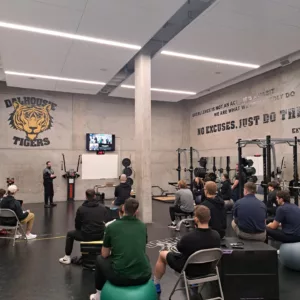CSCA Novia Scotia Conference Recap 2024

Written by Shauna Forsyth – CSCA Vice President and Regional Conference Coordinator.
Dalhousie University was again the gracious host for our 2024 CSCA Atlantic regional conference. This one day event was well attended by S&C professionals working both in the U-Sport and private performance sector, along with numerous Kinesiology students eager to learn more about the intricacies of high performance training and achieving success as a strength and conditioning coach.
Registration took place in Dalhousie’s High Performance room and was a great opportunity for the attendees to reconnect with former classmates and colleagues. VALD, our regional sponsor for the second year running was represented by Frank McKinnon, who was onsite throughout the day to answer questions and showcase VALD’s performance technology.
As the current CSCA Vice President and conference host, I welcomed everyone to the conference and started things off with a small ice breaker of attendee introductions and a brief summary of where they work or study. This exercise showcased the range of professionals and students in attendance this year.
We had 6 presenters join us with Mental Performance Consultant Nicole Kuzmich kicking off the event. Nicole’s opening question of “What makes something high performance” made way for small group discussion on not only the question, but it’s many facets and how they work together to contribute to the mental performance of a high performance individual. Nicole was extremely successful in streamlining this topic to the S&C realm and was able to provide us with concrete methods that we as coaches can use to address, recognize, and enhance the mental performance of the athletes and clients we work with.
Josh Crouse, Head S&C coach at St. Francis Xavier University followed up with an extremely insightful presentation on the challenges and triumphs of developing multi-million dollar facilities. Josh shared with us the lessons he has learned from over 10 years of experience in developing high performance facilities at both Acadia University and presently St. FX. He addressed key factors involved in this complex process including developing blueprints, collaboration with stakeholders, addressing budget complications, implementing contingency plans, dealing with equipment companies, and overcoming the various roadblocks that can accompany a large project.
I ended our morning session with an extensive overview of the CSCA’s Certified Strength and Conditioning Professional (CSCP) accreditation. I provided attendees with the background behind the development of both the Legacy Distinction and the New Professional Mentorship Program. All policies and procedures were explained in detail for each accreditation pathway. The program outcomes and competencies of the New Professional Mentorship Program was explained along with the crucial role the CSCA Mentor coach plays in the process. I encouraged coaches who currently qualify for the Legacy Distinction to begin their application process and become part of the CSCA Mentor Coach network. There were many questions and discussion that followed along with a sense of optimism and excitement for Canada’s 1st and only S&C accreditation.
Following lunch, we moved down to the High Performance room for our afternoon session. Frank McKinnon, VALD’s Atlantic Canada representative gave a great presentation from a project management perspective on best practices for scheduling, administering and producing successful athlete testing events. He discussed ways and his own personal experiences on mitigating risks during such events and how to successfully integrate highly sought-after technologies, such as the ones VALD is highly known for.

Jordan Solochotiuk followed Frank with a presentation outlining how he approaches his speed development programs for field based athletes, more specifically, football and rugby at St.FX. He focused on drills designed to enhance acceleration and top speed and how those drills, with the addition of curvilinear speed work together can complement each other towards the holistic approach for the field athlete. He provided attendees with examples of how he prescribes such drills, more specifically his dosage and rest periods that make up his speed sessions. He finished by discussing his experience with the 8 Vector system and had attendees volunteer to demonstrate a few simple, yet effective drills that can be used with minimal space and how to progress each one.
Vincent Lucente wrapped up the day by presenting us with his S.E.E model of High Performance Athlete Management. We learned the Scalable, Efficient, and Effective delivery of his applied sport science initiative to his athletes. Vincent is extremely passionate about his work with young athletes and truly embraces the role he plays in not only their athletic development, but the transferable skills they can use to succeed in other facets of their lives. Vincent detailed how he incorporates VBT and force plate analysis into the day-to-day operations of his facility and how use of such technology creates trust, buy-in, and a sense of autonomy from his athletes. He highlighted how his work with Hawkin Dynamics supports his athlete management process with other allied health professionals, more specifically pertaining to his work with ACL return-to-play athletes. My biggest take way from Vincent’s presentation was that his true success as a coach is the result of the lifelong trusting relationships he develops with his athletes.
Feedback from both attendees and presenters was extremely positive with some talk already of next year’s event. A small group of coaches continued our networking in classic East Coast fashion over a couple of cold pints at Garrison Brewery on the Halifax Waterfront.
I am beyond grateful to all our speakers, coaches, and students who not only attended the conference, but remain committed to growing the profession of S&C in Atlantic Canada.






